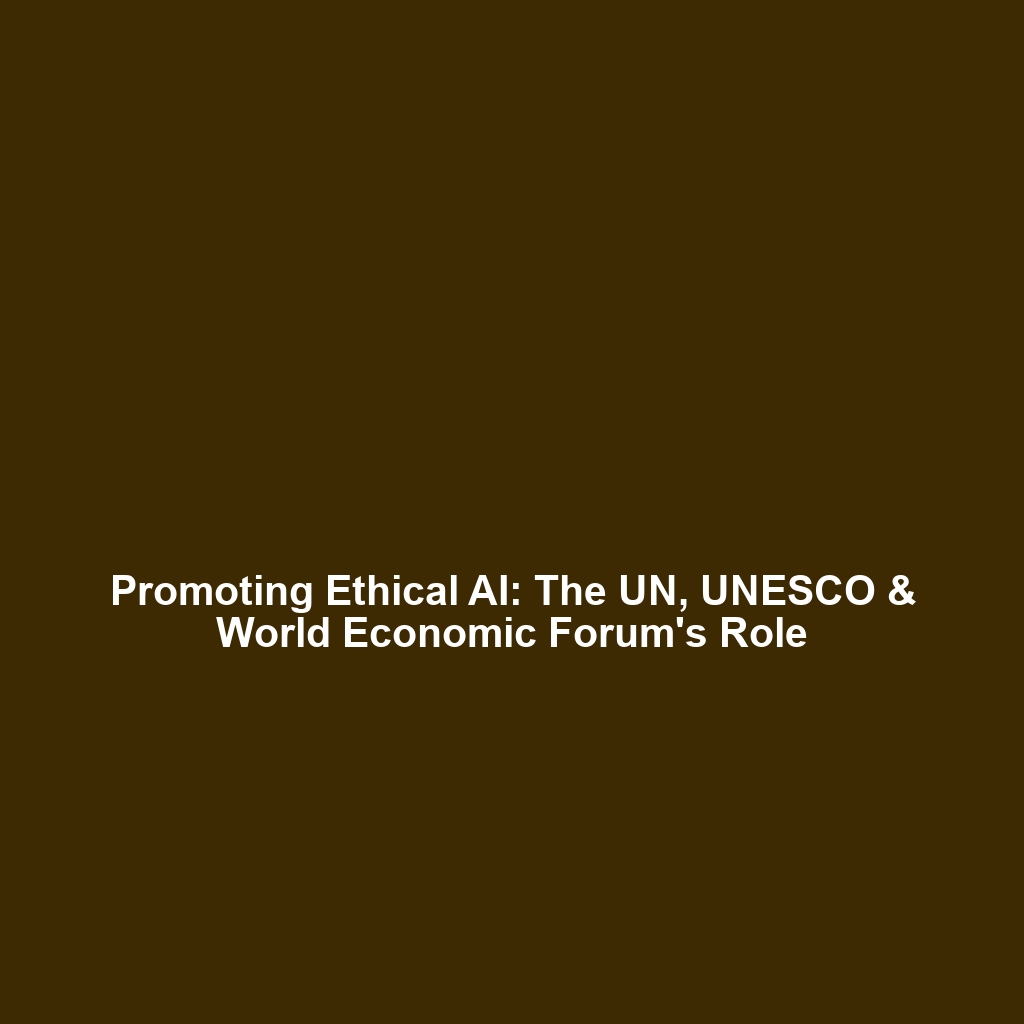The Role of Organizations like the United Nations, UNESCO, and the World Economic Forum in Promoting Ethical AI Use
Introduction
In today’s rapidly evolving technological landscape, the ethical implications of artificial intelligence (AI) have become a focal point for global governance. Organizations such as the United Nations, UNESCO, and the World Economic Forum play pivotal roles in shaping policies and frameworks that advocate for ethical AI use. As AI technologies continue to permeate various sectors, the involvement of these entities underscores the importance of ensuring that AI serves humanity positively and responsibly. Promoting ethical guidelines in AI not only safeguards individual rights but also enhances public trust and acceptance of AI systems.
Key Concepts
The promotion of ethical AI by international organizations rests on several key concepts:
- Transparency: Organizations advocate for clear and open AI algorithms, enabling users to understand decision-making processes.
- Accountability: Emphasizing the need for stakeholders to take responsibility for AI outcomes helps mitigate risks and harms.
- Inclusivity: Ensuring that AI development involves diverse perspectives fosters equitable access and prevents biases.
- Sustainability: Ethical AI must align with sustainable development goals, promoting innovative solutions to global challenges.
These principles are essential to the broader context of AI Ethics as they guide how AI technologies should be designed, implemented, and regulated to benefit society without infringing on individual rights or freedoms.
Applications and Real-World Uses
The role of international organizations in promoting ethical AI has resulted in significant real-world applications, illustrating how these frameworks can be applied in various contexts. Examples include:
- Policy Guidelines: The United Nations has developed guidelines that help countries formulate their own AI policies, ensuring ethical considerations are prioritized.
- Educational Programs: UNESCO is actively involved in providing education on AI ethics, empowering individuals and organizations to navigate the ethical landscape of AI technology.
- Global Forums: The World Economic Forum hosts discussions and workshops that bring together stakeholders to address ethical challenges in AI, fostering collaboration and knowledge exchange.
These initiatives exemplify how global organizations are effectively working toward the ethical implementation of AI technologies.
Current Challenges
Despite the progress made, several challenges persist in the study and application of ethical AI guidelines promoted by these organizations:
- Lack of Standardization: Different regions may adopt varying standards, leading to inconsistencies in ethical practices.
- Resistance to Change: Established systems may be resistant to new ethical frameworks, complicating integration efforts.
- Resource Limitations: Many organizations face constraints in funding and expertise, hindering implementation efforts.
- Public Awareness: There remains a general lack of understanding among the public regarding the importance of ethical AI and its implications.
Future Research and Innovations
Looking ahead, research focused on the role of these organizations is anticipated to yield new innovations and frameworks in ethical AI. Potential areas of exploration include:
- Advancements in AI Governance: Research on efficient governance models that integrate ethical considerations into AI development.
- Next-Generation Technologies: Innovations such as explainable AI (XAI) that adhere to ethical guidelines are gaining momentum.
- Cross-Collaboration Efforts: Increased partnerships between governments, academia, and industry to refine AI ethics protocols further.
Conclusion
The role of organizations like the United Nations, UNESCO, and the World Economic Forum is crucial in promoting ethical AI use. Their contributions are fundamental to shaping policies and practices that uphold ethical standards in AI, ensuring its benefits are realized globally while minimizing potential harms. As we look to the future, collaborative efforts and continued research will be essential in navigating the complexities of AI Ethics.
Learn more about AI Ethics initiatives.

Leave a Reply